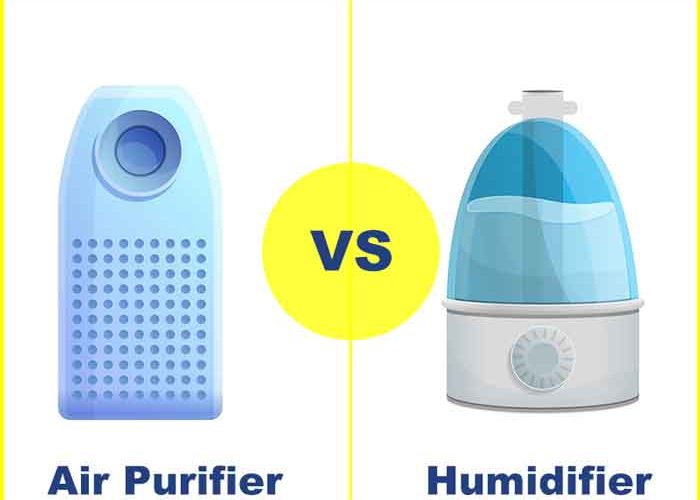Are you looking to improve indoor air quality, or to increase the level of humid air? and which one is good for your baby?
Well, we have analyzed the key differences between the two appliances in this article. It is important to note that air purifier also known as air cleaner are designed to reduce mold, control odors, clean and purify air from allergens whereas, humidifier only increases the humidity level which is required for good health. Therefore, it really depends on your need either one or both can be a better choice.
Major difference between Air Purifier and Humidifier:
Air Purifier
Humidifier
| Blender | Name | |
|---|---|---|
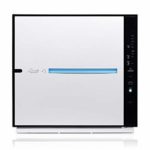 CHECK PRICE | Best Overall Value Rabbit Air Ultra Quiet | Type: Air Purifier Color: White Weight: 23.8 lbs Room Coverage: 700 sqft Noise Levels: 20.8-45.6 dB Price: $549.95 Warranty: 5 years Features: Wifi Enabled (Smart Air Purifier) |
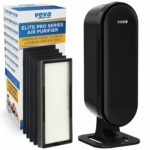 CHECK PRICE | Also Great VEVA 8000 Elite Pro | Type: Air Purifier Color: Black Weight: 6.72 lbs Room Coverage: 325 sqft Price: $99.99 Warranty: 2 years Features: Captures Tiny Particles .3 microns |
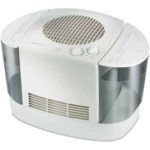 CHECK PRICE | Best Value Honeywell | Type: Humidifier Color: White Weight: 18.7 lbs Coverage: 2,000 sq.ft Capacity: 1.5 gal Run Time: 24 Hrs Warranty: 3-year |
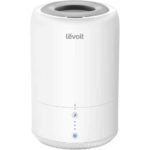 CHECK PRICE | Best Performance LEVOIT | Type: Humidifier Power: Plugin Capacity: 0.48 gal Weight: 10.1 oz Run Time: 8–20 hours Filter: Not Required Warranty: 1 year warranty |
Application of Air Purifiers and Humidifiers
Both air purifiers and humidifiers are tasked with improving your indoor air quality, which is achieved differently. These devices go a long way in relieving the symptoms associated with asthma, allergies, sinus, and respiratory issues, but their relief method varies significantly.
For instance, an air purifier will come in handy when looking to rid your home’s atmosphere of pet dander, pollen, dust, smoke, and mold spores, among other particles.
Conversely, a humidifier strives to add moisture into your indoor atmosphere to attain the recommended humidity levels and relieve any irritation resulting from excessively dry air.
Mode of Operation
Air purifiers eliminate airborne particles and contaminants from your indoor environment through a filtration system. These devices suck air from your indoor environment into a system consisting of an array of filters, which cleans it up before releasing it back into the room.
Air purifiers with HEPA filters are the most popular; they’re capable of trapping airborne particles as small as 0.3 microns and eliminating 99.7% of indoor contaminants.
Conversely, humidifiers work by converting the water in their reservoirs into a fine mist before releasing it into the atmosphere. To keep the unit functional, the user must replenish the reservoir with water frequently. A humidifier goes a long way in raising a room’s relative humidity.
Key Highlights:
Air Purifier: Removes airborne particles and eliminates contaminants
Humidifier: Improves air humidity as required for humans
When should you choose an Air Purifier over Humidifier?
- If you’re suffering from allergies caused by pet dander, dust mites, or pollen, a humidifier won’t be of much use to you. In such circumstances, you will want to invest in a good air purifier to rid your indoor environment of the allergens floating around in the air. This will prevent the airborne contaminants from reaching your eyes, lungs, or throat.
- You need an air purifier if you’re looking to rid your home of smoke emanating from cigarettes or fireplaces
- If you’re looking to reduce indoor dust particles and prevent them from settling on your furniture and appliances, we endorse air purifiers over humidifiers
- To prevent a recurrence of severe respiratory conditions like asthma, you will want to get yourself an air purifier
- If you own a pet, you need an air purifier to get rid of pet dander, odors, and germs that might be brought into the house by these animals.
- If your house reeks of disinfectants and varnish, you will require an air purifier capable of removing volatile organic compounds.
- An air purifier will also go a long way in eliminating stale air from your indoor environment
- If you’re living with a severe chest condition like chronic obstructive pulmonary disease or emphysema, you require investing in a good air filter capable of filtering dust, pollen, and tobacco smoke
- Do you often snore? Airborne allergens could be causing a blockage in your respiratory system. Get yourself an air purifier to eliminate such allergens.
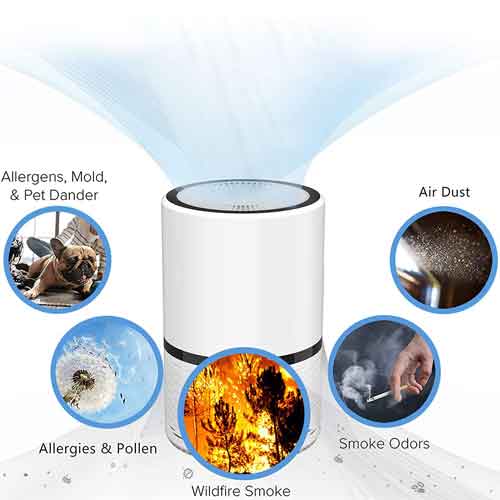
When Is a Humidifier Preferable over an Air Purifier?
- A humidifier best handles sinuses and nosebleeds. This is especially true when you discover that your respiratory issues are worsened by dry air and same goes for children who have congestion during cold winter months.
- We recommend using humidifiers in the winter when the air is dehydrated. During the winter, you probably turn up the heat to combat the cold, which, unfortunately, saps the atmosphere’s moisture. Heated air within a home dries out your nasal passage and prevents your nose from supplying the required humidity to the lungs.
- If your skin often dries out, cracks, and gets irritated, you should make sure your indoor humidity is maintained and if not then invest in a good humidifier. A humidifier could be the one thing you need to get relief from itchy skin caused by skin conditions such as eczema. Same goes for baby’s skin that can suffer from the lack of humid air.
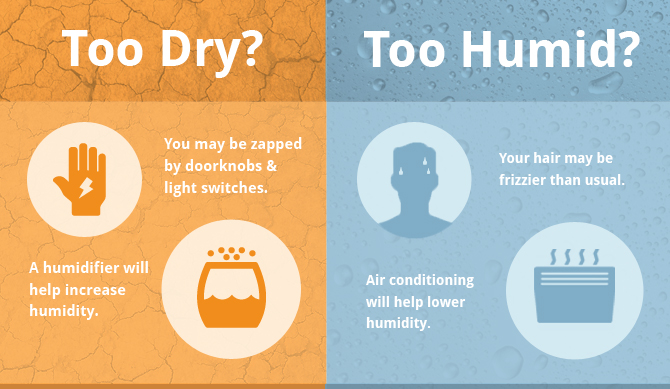
When Can You Benefit from Both Air Purifiers and Humidifiers?
- People living with asthma might need both air cleaners and humidifiers. As air purifier will eliminate asthma-triggering particles from your indoor space, components that would otherwise irritate your throat and lungs. While humidifiers won’t remove contaminants from your indoor environment, they render the air more breathable for asthma patients by adding the moisture back into an otherwise dry atmosphere.
- If you have a baby, you stand to benefit significantly from both air cleaners and humidifiers. An air purifier will provide cleaner air for your baby and thus promoting improved health. A good air purifier will rid your atmosphere of harmful microorganisms and dust, allowing your baby to flourish. Air purifiers with an appropriate filter also go a long way in containing diaper odors. On the other hand, a humidifier will allow your baby to breathe easier and afford them a healthy skin by improving the level of humidity.
- If your allergies are the product of mold infestation, both air purifiers and humidifiers will come in handy. Air purifiers will serve to clear the air of mold spores. Conversely, humidifiers will eliminate the excess moisture that supports the growth of mold.
Key Take-away
Most people cannot tell the difference between an air purifier and a humidifier; they erroneously believe it’s the same thing. However, these two are very different in both functionality and benefits.
Humidifiers strive to solve the issues brought about by dry air. Such include chapped lips, skin irritation and dryness, nosebleeds, dry coughs, and issues with your vocal cords, among others. A humidifier will essentially reinstate the moisture in your room to the recommended levels. If dry air and dry heat are an issue in your home, you need to invest in a humidifier.
On the other hand, air purifiers are designed to rid your indoor air of bacteria, allergens, and viruses, among other contaminants capable of negatively impacting your health. If you’re often sneezing or suffering from asthma, allergies, and skin rash, you probably need an air purifier.
It’s also possible that you require both an air purifier and a humidifier. Using both devices side by side will ensure that the air in your room is clean and with the appropriate amount of humidity. Fortunately, our research reveals that there are many air purifier and humidifier combos that will help you achieve the right amount of indoor humidity while cleansing your air. Such units will save you a few bucks and space when looking to combat allergy issues and respiratory distress.
If you buy standalone units for air purification and humidification, we recommend placing the devices away from each other, preferably at opposite corners of the room. This will prevent the humidifier’s moisture from clogging the air purifier’s filter, which could otherwise cause mold and bacteria growth.

